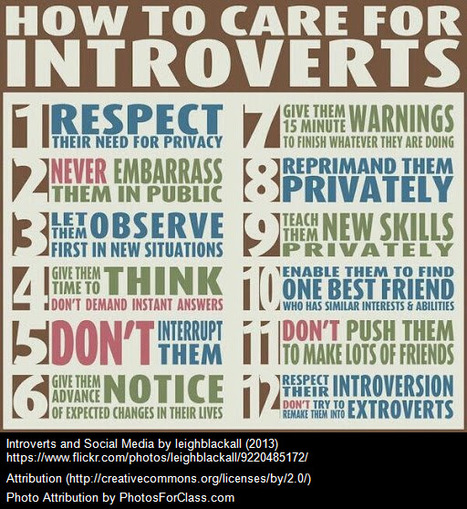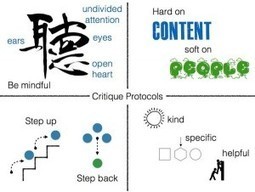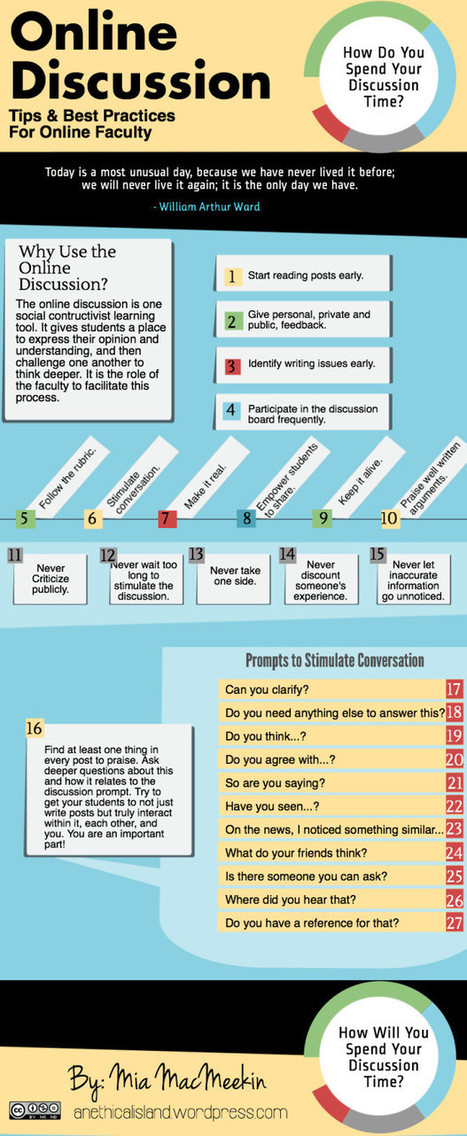Expertly facilitated online discussion is the driving force for community in online classes. Creating norms for discussion quality and timing improve the dialog. This also helps the facilitator step back as students learn to deepen their online dialog.Click here to edit the content
Get Started for FREE
Sign up with Facebook Sign up with X
I don't have a Facebook or a X account
 Your new post is loading... Your new post is loading...
 Your new post is loading... Your new post is loading...

HCL's curator insight,
March 6, 2017 8:20 PM
A little long but raises some valuable points on eliciting effective online discussions...
diane gusa's curator insight,
March 17, 2016 4:53 PM
We teach best practices for online teaching in our Graduate Certificate Program at UW-Stout. This article gives you a give overview of those practices. 
Régis Faubet's curator insight,
March 21, 2016 5:54 AM
We teach best practices for online teaching in our Graduate Certificate Program at UW-Stout. This article gives you a give overview of those practices. 
Alexandria Yaxley's curator insight,
March 22, 2016 4:44 AM
We teach best practices for online teaching in our Graduate Certificate Program at UW-Stout. This article gives you a give overview of those practices.

Ellen Comito McKeown's curator insight,
June 24, 2015 11:15 AM
Spells out rules for netiquette. Good way to start out with students who are used to posting on social networks and ranting. In the comments, the college stated that teachers can reprint this for their classrooms as long as they give credit to Touro College.

Rosemary Tyrrell, Ed.D.'s curator insight,
October 4, 2014 12:55 PM
A PDF with tons of great insights. |

Marla Bucy's curator insight,
April 22, 2016 2:26 PM
This is the kind of information that I think students who must peer review each other's writing would find helpful: This blog entry provides useful adjectives without an overwhelming amount of instruction.

Raj Shekhar Mishra's curator insight,
March 21, 2015 3:12 AM
Discussions have a potential for meaningful learning when properly guided as outlined by Alex Joppie in the article "The Art of the Discussion Prompt".

Irmgard Huppe's curator insight,
November 28, 2014 5:13 AM
short and sharp collection of a few important pointers 
Almudena Rueda's curator insight,
February 7, 2015 1:17 PM
Another great Infographics from Edudemic.

online4ed's curator insight,
October 7, 2014 9:37 AM
Why I work so hard to help students realize the more they put in to the class, the more they will get out! 
David Bramley's curator insight,
October 7, 2014 7:05 PM
The go-to activity for most teachers looking to add an activity to their online offering is the forum. But the activity is often ill thought through, the teacher doesn't participate themselves and as a result the forum fails to launch!
This post looks at threaded discussions and how teachers can use them to facilitate peer to peer discussion that will add value to the learning experience. Highly recommended 
Deborah Eastwood's curator insight,
October 12, 2014 1:15 PM
Understanding the importance of the discussion board in the online classroom. |









![15 Rules of Netiquette for Online Discussion Boards [INFOGRAPHIC] - Online Education Blog of Touro College | Distance Learning, mLearning, Digital Education, Technology | Scoop.it](https://img.scoop.it/HG90Nll1xIIkTewhegBvQjl72eJkfbmt4t8yenImKBVvK0kTmF0xjctABnaLJIm9)

















